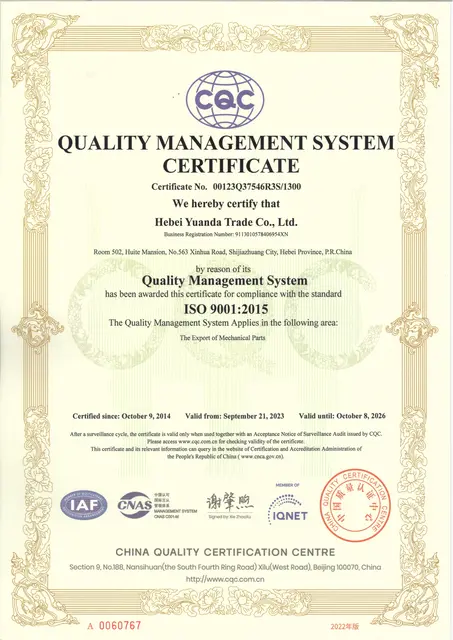Mobile:+86-311-808-126-83
Email:info@ydcastings.com
Exploring the Design and Efficiency of Submersible Motor Impellers in Pump Applications
The Submersible Motor Impeller A Key Component in Fluid Dynamics
Submersible motor impellers play a critical role in various applications, particularly in pumping systems, where their design and functionality significantly impact efficiency and performance. Found in a range of devices from submersible pumps to mixers and even in wastewater treatment facilities, understanding the mechanics and importance of these components is essential for achieving optimal operation in fluid dynamics.
An impeller is a rotating component designed to move fluids by imparting a mechanical energy into the liquid, thereby generating flow. In a submersible motor setup, the impeller is typically housed within the fluid it is meant to pump, directly connected to an electric motor that drives its rotation. By converting rotational motion into kinetic energy, the impeller increases the velocity of the fluid, allowing it to be discharged through a discharge pipe or vent.
The design of a submersible motor impeller is pivotal in determining its efficiency. Common designs include radial, axial, and mixed flow impellers, each tailored for specific applications. Radial impellers are well-suited for high-pressure applications, as they push fluid outward from the center. Axial impellers, on the other hand, move fluid in a parallel direction to the impeller's rotation, making them ideal for applications requiring higher flow rates at lower pressures. Mixed flow impellers combine features of both designs, offering versatility for various pumping needs.
Material selection is another critical factor in impeller design. Given that submersible motor impellers often work with corrosive substances or abrasive particles, materials such as stainless steel, bronze, and specially formulated plastics are frequently employed. These materials not only enhance durability but also ensure that the impeller can maintain operational efficiency over time, reducing maintenance costs and downtime.
submersible motor impeller

One of the foremost advantages of submersible motor impellers is their energy efficiency. Compared to above-ground pumping systems, submersible pumps can significantly reduce energy consumption due to their submerged nature, which minimizes the need for priming and reduces the risk of vapor lock. Furthermore, modern advancements in technology have led to the development of high-efficiency impellers that maximize fluid movement while minimizing wasted energy.
However, like any mechanical component, submersible motor impellers are not free from challenges. Cavitation, a phenomenon that occurs when the pressure of a liquid falls below its vapor pressure, can lead to performance issues and potential damage to the impeller. To mitigate this risk, careful attention must be given to the design parameters, including the impeller's shape, operating speed, and fluid characteristics. Additionally, maintaining proper installation and operational practices is essential in ensuring the longevity and effectiveness of the impeller.
As industries continue to innovate and grapple with the challenges of resource management and environmental sustainability, the role of submersible motor impellers will likely expand. In applications ranging from agricultural irrigation to industrial processes and municipal water supply, efficient fluid movement is integral to effectiveness. Advancements in materials science, design technology, and energy efficiency will pave the way for more sophisticated impeller designs that adapt to the growing demands of various industries.
In conclusion, submersible motor impellers are vital components in the world of fluid dynamics, providing essential functionality across a diverse range of applications. Their design, efficiency, and material properties are instrumental in achieving optimal performance. As technology evolves, continued innovations in impeller technology will ensure they remain a reliable choice for efficient fluid movement, further solidifying their critical role in sustainable practices and industrial growth.
-
What Makes Stainless Steel Pump Casting Essential for Modern Industries?NewsJul.14,2025
-
Revolutionize Your Engine Maintenance with Premium Aluminum and Cast Iron ComponentsNewsJul.14,2025
-
Precision Flow Engineering Starts with the Right Pump ComponentsNewsJul.14,2025
-
Maximize Efficiency: Explore Reliable Containment and Crop SolutionsNewsJul.14,2025
-
Discover Superior Performance with Advanced Turbo ComponentsNewsJul.14,2025
-
Boost Fluid Dynamics with Precision-Engineered Pump ComponentsNewsJul.14,2025











